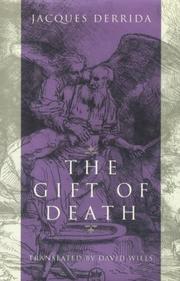Check nearby libraries
Buy this book

Derrida's main concern is with the meaning of moral and ethical responsibility in Western religion and philosophy. He questions the limits of the rational and the responsible that one reaches in granting or accepting death, whether by sacrifice, murder, execution, or suicide.
Beginning with a discussion of Patocka's Heretical Essays on the History of Philosophy, Derrida develops Patocka's ideas concerning the sacred and responsibility through comparisons with the works of Heidegger, Levinas, and, finally, Kierkegaard. Derrida's treatment of Kierkegaard makes clear that the two philosophers share some of the same concerns. He then undertakes a careful reading of Kierkegaard's Fear and Trembling, comparing and contrasting his own conception of responsibility with that of Kierkegaard, and extending and deepening his recent accounts of the gift and sacrifice.
For Derrida, the very possibility of sacrifice, especially the ultimate sacrifice of one's own life for the sake of another, comes into question.
Check nearby libraries
Buy this book

Previews available in: English
| Edition | Availability |
|---|---|
| 1 |
cccc
|
|
2
The Gift of Death
June 1, 1996, University Of Chicago Press
Paperback
in English
- New edition
0226143066 9780226143064
|
zzzz
|
| 3 |
aaaa
|
| 4 |
zzzz
|
Book Details
Edition Notes
Includes bibliographical references.
Classifications
The Physical Object
Edition Identifiers
Work Identifiers
Source records
Internet Archive item recordmarc_openlibraries_sanfranciscopubliclibrary MARC record
marc_claremont_school_theology MARC record
Better World Books record
Library of Congress MARC record
marc_claremont_school_theology MARC record
marc_columbia MARC record
marc_columbia MARC record
Work Description
French philosopher Derrida stares death in the face in this dense but rewarding inquiry. Beginning with an analysis of an essay on the sacred by Czech philosopher/human rights activist Jan Patocka, Derrida follows the development of moral and ethical responsibility, and the concept of the soul's immortality, in the transition from Platonism to Christianity. He then ponders the self's anticipation of death in sacrifice, war, orgiastic mystery cults, murder and execution, with reference to Kierkegaard's Fear and Trembling, Nietzsche, Heidegger's thought (a constant attempt to separate itself from Christianity'') and the biblical story of Abraham's contemplated sacrifice of his son, Isaac, at God's behest. In the most provocative section, Derrida links religious injunctions of sacrifice to the monotonous complacency'' of modern society, which allows tens of millions of children to die of hunger and disease.
Community Reviews (0)
| November 7, 2023 | Edited by | Merge works |
| December 2, 2020 | Edited by MARC Bot | import existing book |
| April 28, 2010 | Edited by Open Library Bot | Linked existing covers to the work. |
| December 10, 2009 | Created by WorkBot | add works page |












